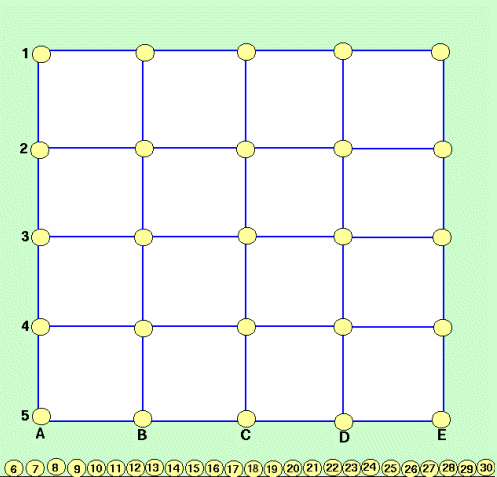Criss Cross Quiz
A game for 2 players. Practises subtraction or other maths operations knowledge.
A game for two players. Practices subtraction or other maths operations knowledge. Uses coordinate geometry to locate the numbers used.
You Will Need:
- A copy of the game board
- 25 circles with the numbers from 6 to 30 (inclusive) written on them
- A pencil and paper
Getting ready to play:
Using all of the numbers from 6 to 30, write a different number on one of the circles on the game board.
Don't write the numbers in counting order, write them randomly in the circles.
To help keep track, as you use a number, cross it out from the bottom circles.
You may not use the same number twice.
Make sure your opponent can't see your game board.
Decide who will go first and who will be second.

The aim:
To gain as many points as possible by answering maths facts problems.
To play:
- Choose a coordinate to locate a circle and number on your opponent's board. (For example, I might call C,4. Always call the letter before the number. Both myself and my opponent then find the circle on our board where the lines C and 4 cross each other.)
- Each player calls out the number that has been written on the called circle (at C,4 in my example).
- Find the difference between the smaller number and the larger number.
- Score 2 for a correct answer.
- Cross out the number circle you have just used. It can't be used again.
- If both your and your opponents circles have the same number in them, cross out the numbers but score 0.
- Whoever called the greater of the two numbers used gets a bonus of 5.
- Score 0 for an incorrect answer, and get no bonus award for having the greater number.
- Keep a running total of your score on your paper.
- Keep playing until all the circles are crossed out.
- The player with the highest score wins.
Variations:
Keeping the board and numbers the same, addition can be the operation practiced. If practice is needed in multiplication, the given numbers can be altered according to the facts that need to be worked on.
Increasing the value of the chosen numbers or choosing a smaller set of lower numbers and repeating them will allow the level of difficulty to be matched to the skill level of the players.
